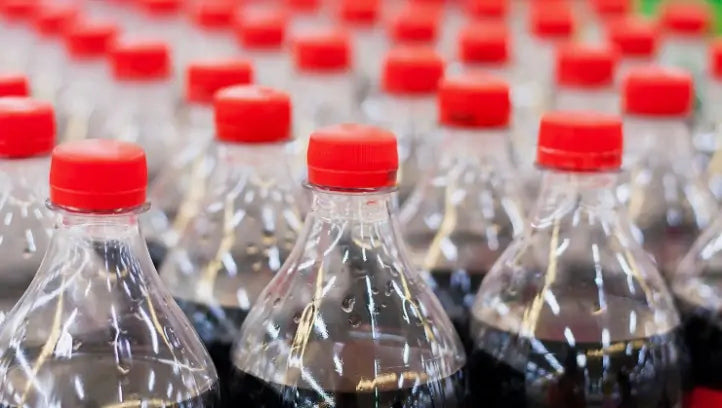Your basket is currently empty.
Shop NowRecycle Plastic Bottles and Cans For Money? Here's How!

A Deposit Return Scheme has been on the government’s agenda for a while. Now it’s official; it’s happening. From 2025, recycling plastic bottles and drink cans in England, Wales, and Northern Ireland will become much easier. The best thing? You will earn money for recycling plastic bottles and cans!
How will the Recycle Plastic Bottles and Cans for Money scheme work?
The Environment Minister Rebecca Pow announced that the scheme would become reality last month. A consultation found that if people paid small deposits on single-use drinks containers, they'd be more likely to recycle. 83% of respondents were in favour of the introduction of a deposit return scheme.
As part of the scheme, reverse vending machines will be installed at designated sites. People will be able to return their bottles and cans and get their cash back. Most of the machines will be on retail premises.
The UK Government will work with the administrations in Wales and Northern Ireland, as well as industry to deliver the scheme. Infrastructure must be set up and labelling is set to be amended. The Government is also setting up a Deposit Management Organisation to run the scheme. It’s this organisation that will decide on how much the refundable deposit is. The hope is that in the three years following the launch, there'll be 85% fewer drinks containers in the environment.
The industry response
As well as having the support of a vast majority of people in the UK who want to get paid for recycling, the industry has responded well to the news.
Coca-Cola said it welcomed the Government’s commitment to making recycling easier for people while delivering the best outcome for the environment. The British Soft Drinks Association said it looked forward to working with the Government to ‘kickstart the UK’s circular economy for drinks containers.’
Why start the recycle for money scheme now?
Each year, UK consumers drink their way through 14 billion plastic bottles and 9 billion drink cans. Only about half of these are recycled. The rest end up as litter or in a landfill site. Now, says the Environment Minister, the Government wants to support people who want to do the right thing.
“We want to support people who want to do the right thing to help stop damaging plastics polluting our green spaces or floating in our oceans and rivers. That is why we are moving ahead using our powers from our landmark Environment Act to introduce a Deposit Return Scheme for drinks containers.”
What has already been done about plastic bottle waste?
The deposit return scheme will build on what the government has already done to eliminate unnecessary plastic waste.
Last month, the Government announced that a ban on single-use items like plastic plates, trays, bowls, cutlery, balloon sticks, and polystyrene food and drinks containers will come into force in England in October. Already on the government’s banned list are microbeads in rinse-off personal care products. There are also restrictions on the selling of single-use plastic straws, drink stirrers, and cotton buds.
Then there’s the one we’re all familiar with; the plastic bag charge. That has been a resounding success, cutting plastic bag sales by 97%.
Countries where you can already get paid for recycling
As part of its research, the UK Government looked at examples of successful deposit return schemes in other countries. Here are some of the countries where drinks container recycling has hit lofty heights.
Germany
Germany has had a deposit return scheme since 2003. It’s considered to be one of the world’s most successful schemes. Recycling rates for bottles and cans are close to 100%. The deposit consumers pay on plastic bottles is €0.25. This is higher than the rate for glass bottles (between €0.08 and €0.15) to reflect the impact plastic has on the environment.
Denmark
Denmark launched its deposit return scheme in 2002. There are two ‘systems’ in the Danish scheme. One is for reusable drinks containers like plastic and glass bottles. The other is for ‘one-way’ containers such as cans. This refers to the fact that while you can wash and refill bottles, you must reprocess cans to turn them into a new cans. There are different deposit amounts based on the drink's container materials and size.
Here are the current deposits people can claim back:
- Glass bottles and aluminium cans (less than 1 litre) DKK 1.00
- Plastic bottles (less than 1 litre) DKK 1.50
- All bottles and cans over 1 litre DKK 3.00
As well as reverse vending machines in stores, Danish consumers can return up to 90 bottles and cans to a deposit return bank.
As a result of the scheme, the recycling rate for drinks containers is more than 90%.
Poland
Poland hasn’t technically got a scheme yet, but it’s set to introduce one this year. Originally planned for last year, the new plans will now include the recycling of aluminium cans. These weren't part of the original scheme.
The scheme will be optional for small shops of up to 100 square meters in size. The Government expects the scheme to help reduce plastic pollution considerably.
Making recycling easier
There’s been plenty of talking and now it seems, it’s time for action. If you want less litter and easy recycling, the deposit return scheme just might make your wish come true.
What do you think about getting paid for recycling? We’d love to know! For more interesting articles on making money from recycling or if you are looking for a plastic bottle recycling bin or can recycling bin we have something for every need!
